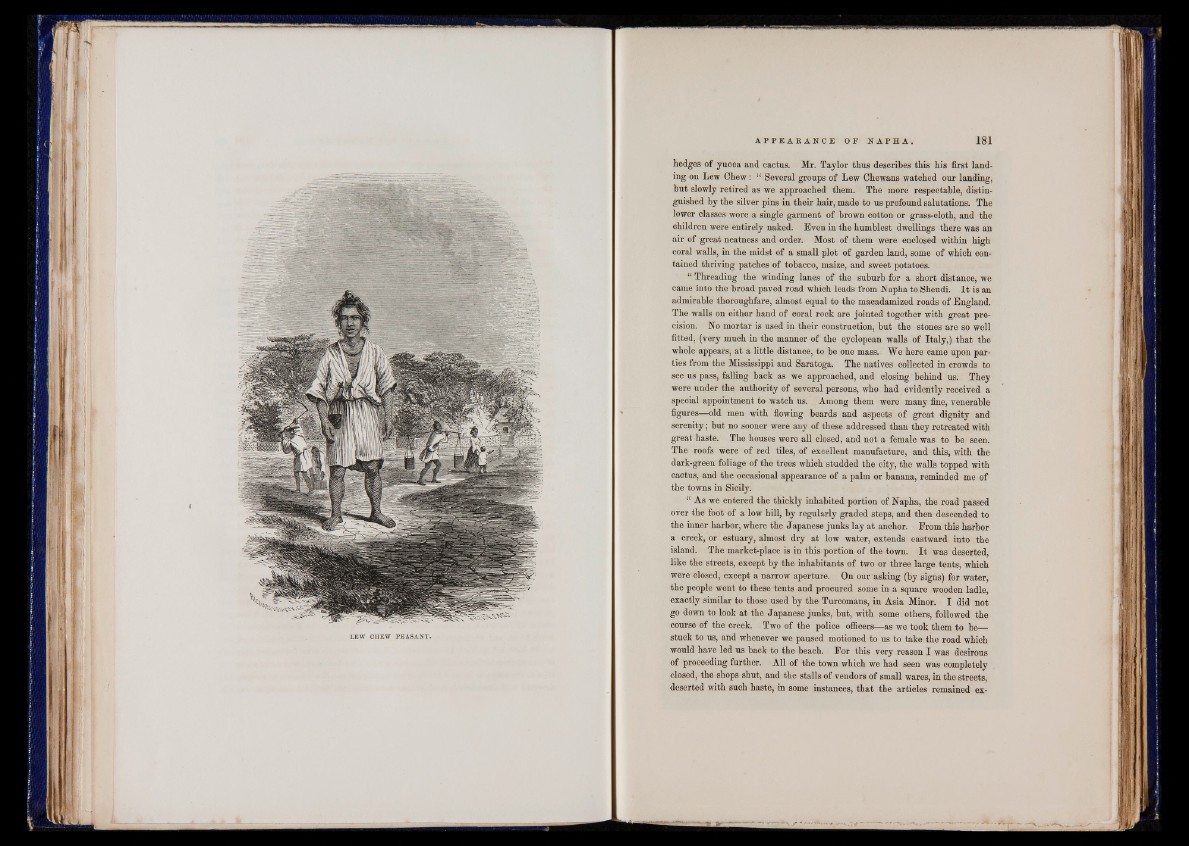
L EW OHEW P E A S A N T .
hedges of yuoca and caotus. Mr. Taylor thus describes this his first landing
on Lew Chew: “ Several groups of Lew Chewans watched our landing,
but slowly retired as we approached them. The more respectable, distinguished
by the silver pins in their hair, made to us profound salutations. The
lower classes wore a single garment of brown cotton or grass-cloth, and the
children were entirely naked. Even in the humblest dwellings there was an
air of great neatness and order. Most of them were enclosed within high
coral walls, in the midst of a small plot of garden land, some of which contained
thriving patches of tobacco, maize, and sweet potatoes.
“ Threading the winding lanes of the suburb for a short distance, we
came into the broad paved road which leads from Napha to Sheudi. I t is an
admirable thoroughfare, almost equal to the macadamized roads of England.
The walls on either hand of coral rock are jointed together with great precision.
No mortar is used in their construction, but the stones are so well
fitted, (very much in the manner of the eyelopean walls of Italy,) that the
whole appears, at a little distance, to be one mass. We here came upon parties
from the Mississippi and Saratoga. The natives collected in crowds to
see us pass, falling back as we approached, and closing behind us. They
were under the authority of several persons, who had evidently received a
special appointment to watch us. Among them were many fine, venerable
figures—old men with flowing beards and aspects of great dignity and
serenity; but no sooner were any of these addressed than they retreated with
great haste. The houses were all closed, and not a female was to be seen.
The roofs were of red tiles, of excellent manufacture, and this, with the
dark-green foliage of the trees which studded the city, the walls topped with
cactus, and the occasional appearance of a palm or banana, reminded me of
the towns in Sicily.
“ As we entered the thickly inhabited portion of Napha, the road passed
over the foot of a low hill, by regularly graded steps, and then descended to
the inner harbor, where the Japanese junks lay at anchor. From this harbor
a creek, or estuary, almost dry at low water, extends eastward into the
island. The market-place is in this portion of the town. I t was deserted,
like the streets, except by the inhabitants of two or three large tents, which
were closed, except a narrow aperture. On our asking (by signs) for water,
the people went to these tents and procured some in a square wooden ladle,
exactly similar to those used by the Turcomans, in Asia Minor. I did not
go down to look at the Japanese junks, but, with some others, followed the
course of the creek. Two of the police officers—as we took them to be—
stuck to us, and whenever we paused motioned to us to take the road which
would have led us back to the beach. Eor this very reason I was desirous
of proceeding further. All of the town which we had seen was completely
closed, the shops shut, and the stalls of vendors of small wares, in the streets,
deserted with such haste, in some instances, that the articles remained ex